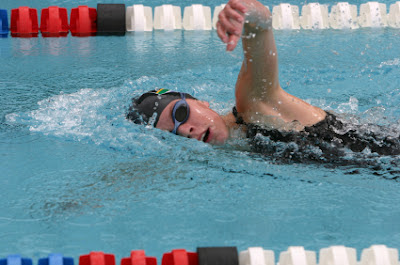How to Swim Without Getting Tired in Ten Steps
How to swim without getting tired in ten steps is about mastering two skills:
- Glide through the water without much resistance.
- Anchoring your hands to move forward.
 |
| Swimming Freestyle Without Getting Tired |
Those are two sensations that you have when you are swimming correctly. If you're just starting out, there are a few things you need to focus on before you feel the glide and anchor.
10 Steps
With the 10 steps I’m about to tell you, you can surely swim for an hour and a half without getting tired.
- - The first thing you should learn is to keep calm with your face underwater.
- - Practice kicking on your back while looking at your feet, trying to create turbulence only in the feet and not in the knees. The more you do this exercise, the better your legs will float near the surface when you swim freestyle.
- - Practice rotation of your shoulders to increase the speed of your arms.
- - Because of their shape and speed, the hands create pressure in the water. You can use that pressure to anchor your hands. Your arms are the levers that move your body forward.
- - Breathing
- - Rotator cuff tendinitis is the most common injury in swimming. This can keep you out of the pool for months. To avoid that, this is the most important exercise you can do:
20 reps on each side before hitting the water. - - The shrug is something that I felt was not clear enough in the video. Here’s another explanation.
- - The last step to make your freestyle look beautiful is a clean entry.
- - Some feel the videos make freestyle look impossible to swim properly. In a way, no one in the world swims perfectly. But swimming perfectly like the animation was never the goal.
- - The best thing we can do to make swimming as easy as walking is for our body not to cause excess drag. And then increase the strength and endurance of our pulling muscles. This helps the legs and the whole body floats more easily in the water.
From now on things get more difficult and progress is going to be slower. You need to find a purpose to keep improving or you will most likely give up and never feel how amazing it is to swim without much effort.
You can increase breathing by breathing every 3 strokes. Then 4, then 5, and work your way up to 10. If you can breathe every 10 strokes while staying calm, you're one step closer to being calmer in the water and in life.
You can do it without any resistance at first. Then, you can use a rubber band or a smaller one to make sure you don't move your elbow.
The other thing you can do to keep your shoulders healthy is to know which technique feels most natural for your level of shoulder mobility. For example, The best swimmers turn the shoulder internally when the hand is still in front. That is not possible for everyone.
Starting the pull a little more open is also a great way to swim, as long as your palm is facing backwards. This will make your stroke move slightly in an S. But don't overdo it by pushing your hand palm toward the wall. That will make you swim in ZIGzag.
The two main muscles that will make you pull your arm faster are the pecs and the lats. The more you stretch them, the longer and more powerful your stroke will be. So, at the start of the stroke, think about stretching those muscles by pushing your shoulder down near your cheek while the elbow remains close to the surface. If you can feel that, you will be able to increase your speed much more. Although that can be a little more demanding.
As Seen On The Videos
We talked (in other videos) about how to do it, but I missed a very important piece of advice. There needs to be a good shoulder rotation at the same time the hand enters the water so that it slides like a knife through butter.
Staying calm and maintaining good technique is the key to success.
Enjoy
Richard







No comments:
Post a Comment